36 start with R start with R
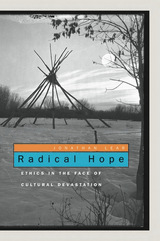
Shortly before he died, Plenty Coups, the last great Chief of the Crow Nation, told his story—up to a certain point. “When the buffalo went away the hearts of my people fell to the ground,” he said, “and they could not lift them up again. After this nothing happened.” It is precisely this point—that of a people faced with the end of their way of life—that prompts the philosophical and ethical inquiry pursued in Radical Hope. In Jonathan Lear’s view, Plenty Coups’s story raises a profound ethical question that transcends his time and challenges us all: how should one face the possibility that one’s culture might collapse?
This is a vulnerability that affects us all—insofar as we are all inhabitants of a civilization, and civilizations are themselves vulnerable to historical forces. How should we live with this vulnerability? Can we make any sense of facing up to such a challenge courageously? Using the available anthropology and history of the Indian tribes during their confinement to reservations, and drawing on philosophy and psychoanalytic theory, Lear explores the story of the Crow Nation at an impasse as it bears upon these questions—and these questions as they bear upon our own place in the world. His book is a deeply revealing, and deeply moving, philosophical inquiry into a peculiar vulnerability that goes to the heart of the human condition.

Mental illness is the poor, and somehow "damaged," cousin to physical ailments in the eyes of too many in our society. Compare the difference in how people would respond to someone who had fallen and broken their leg on the street, to how most react to those mentally ill among us, on those same streets, who spend their winters on steam grates and forage for food in dumpsters. Rationing Sanity is a provocative analysis of the mental health care system in the United States, dealing with issues of justice and access to mental health care.
How should a decent society, affluent but facing many serious calls on its resources, best care for citizens afflicted with severe and persistent mental illnesses? James Lindemann Nelson brings together, for the first time, scholars of the ethics of mental health care and top managed care policy analysts to address this crucial problem. Rationing Sanity integrates those perspectives with the thoughtful practice-based experience of physicians well versed in the actual care of people with emotional and behavioral problems. Over a period of years, the contributors met face-to-face to engage each other on the ethics of managed mental health care—the result is a unique, collaborative effort that provides a wealth of important new insights on not only how Americans can readjust their attitudes toward the mentally ill—but also how we may find more just and humane treatment for those afflicted.
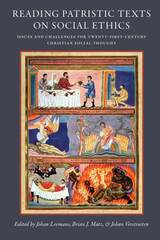
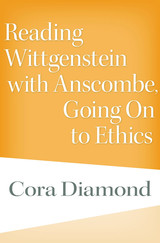
In Reading Wittgenstein with Anscombe, Going On to Ethics, Cora Diamond follows two major European philosophers as they think about thinking, as well as about our ability to respond to thinking that has miscarried or gone astray. Acting as both witness to and participant in the encounter, Diamond provides fresh perspective on the importance of the work of these philosophers and the value of doing philosophy in unexpected ways.
Diamond begins with the Tractatus (1921), in which Ludwig Wittgenstein forges a link between thinking about thought and the capacity to respond to misunderstandings and confusions. She then considers G. E. M. Anscombe’s An Introduction to Wittgenstein’s Tractatus (1959), in which Anscombe, through her engagement with Wittgenstein, further explores the limits of thinking and the ability to respond to thought that has gone wrong. Anscombe’s book is important, Diamond argues, in challenging contemporary assumptions about what philosophical problems are worth considering and about how they can be approached. Through her reading of the Tractatus, Anscombe exemplified an ethics of thinking through and against the grain of common preconceptions. The result drew attention to the questions that mattered most to Wittgenstein and conveyed with great power the nature of his achievement.
Diamond herself, in turn, challenges Anscombe on certain points, thereby further carrying out just the kind of ethical work Wittgenstein and Anscombe each felt was crucial to getting things right. Through her textured engagement with her predecessors, Diamond demonstrates what genuinely independent thought is able to achieve.
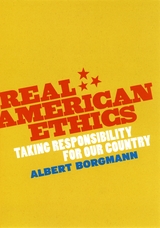
America is a wonderful and magnificent country that affords its citizens the broadest freedoms and the greatest prosperity in the world. But it also has its share of warts. It is embroiled in a war that many of its citizens consider unjust and even illegal. It continues to ravage the natural environment and ignore poverty both at home and abroad, and its culture is increasingly driven by materialism and consumerism. But America, for better or for worse, is still a nation that we have built. So why then, asks Albert Borgmann in this most timely and urgent work, are we failing to take responsibility for it?
In Real American Ethics, Borgmann asks us to reevaluate our role in the making of American values. Taking his cue from Winston Churchill—who once observed that we shape our buildings, and then our buildings shape us—Borgmann considers the power of our most enduring institutions and the condition of our present moral makeup to propose inspired new ways in which we, as ordinary citizens, can act to improve our country. This, he shows, includes everything from where we choose to live and what we spend our money on to daunting tasks like the reshaping of our cities—habits and actions that can guide us to more accomplished and virtuous lives. Using prose that is easy and direct throughout, Borgmann’s position is grounded neither by conservative nor liberal ideology, but in his understanding that he is a devoted citizen among many.
In an age in which the blame game is the only game in town, this patriotic book is an eloquent reminder of the political strength we all wield when we work together.
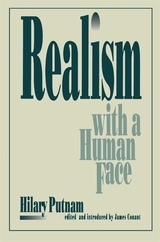
The time has come to reform philosophy, says Hilary Putnam, one of America’s great philosophers. He calls upon philosophers to attend to the gap between the present condition of their subject and the human aspirations that philosophy should and once did claim to represent. Putnam’s goal is to embed philosophy in social life.
The first part of this book is dedicated to metaphysical questions. Putnam rejects the contemporary metaphysics that insists on describing both the mind and the world from a God’s-eye view. In its place he argues for pluralism, for a philosophy that is not a closed systematic method but a human practice connected to real life. Philosophy has a task, to be sure, but it is not to provide an inventory of the basic furniture of the universe or to separate reality in itself from our own projections. Putnam makes it clear that science is not in the business of describing a ready-made world, and philosophy should not be in that business either.
The author moves on to show that the larger human context in which science matters is a world of values animated by ethics and aesthetic judgments. No adequate philosophy should try to explain away ethical facts. The dimension of history is added in the third part of the book. Here Putnam takes up a set of American philosophers, some firmly within and others outside the canon of analytic philosophy, such as William James and C. S. Peirce, and he explores the pragmatist contribution to philosophy from James to Quine and Goodman.
This book connects issues in metaphysics with cultural and literary issues and argues that the collapse of philosophical realism does not entail a fall into the abyss of relativism and postmodern skepticism. It is aimed primarily at philosophers but should appeal to a wide range of humanists and social scientists.
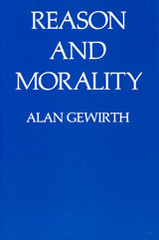
"This is a fascinating study of an apparently intractable problem. Gewirth has provided plenty of material for further discussion, and his theory deserves serious consideration. He is always aware of possible rejoinders and argues in a rigorous manner, showing a firm grasp of the current state of moral and political philosophy."—Mind
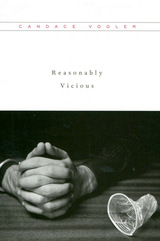
Is unethical conduct necessarily irrational? Answering this question requires giving an account of practical reason, of practical good, and of the source or point of wrongdoing. By the time most contemporary philosophers have done the first two, they have lost sight of the third, chalking up bad action to rashness, weakness of will, or ignorance. In this book, Candace Vogler does all three, taking as her guides scholars who contemplated why some people perform evil deeds. In doing so, she sets out to at once engage and redirect contemporary debates about ethics, practical reason, and normativity.
Staged as a limited defense of a standard view of practical reason (an ancestor of contemporary instrumentalist views), Vogler's essay develops Aquinas's remark about three ways an action might be desirable into an exhaustive system for categorizing reasons for acting. Drawing on Elizabeth Anscombe's pioneering work on intention, Vogler argues that one sort (means/end or calculative reasons for acting) sets the terms for all sound work on practical rationality.
She takes up Aquinas's work on evil throughout, arguing that he provides us with a systematic theory of immorality that takes seriously the goods at issue in wrongdoing and the reasons for unethical conduct. Vogler argues that, shorn of its theological context, this theory leaves us with no systematic, uncontroversial way of arguing that wrongdoing is necessarily contrary to reason.

The Rebirth of the Clinic begins with a bold assertion: the doctor-patient relationship is sick. Fortunately, as this engrossing book demonstrates, the damage is not irreparable. Today, patients voice their desires to be seen not just as bodies, but as whole people. Though not willing to give up scientific progress and all it has to offer, they sense the need for more. Patients want a form of medicine that can heal them in body and soul. This movement is reflected in medical school curricula, in which courses in spirituality and health care are taught alongside anatomy and physiology. But how can health care workers translate these concepts into practice? How can they strike an appropriate balance, integrating and affirming spirituality without abandoning centuries of science or unwittingly adopting pseudoscience?
Physician and philosopher Daniel Sulmasy is uniquely qualified to guide readers through this terrain. At the outset of this accessible, engaging volume, he explores the nature of illness and healing, focusing on health care's rich history as a spiritual practice and on the human dignity of the patient. Combining sound theological reflection with doses of healthy skepticism, he goes on to describe empirical research on the effects of spirituality on health, including scientific studies of the healing power of prayer, emphasizing that there are reasons beyond even promising research data to attend to the souls of patients. Finally, Sulmasy devotes special attention and compassion to the care of people at the end of life, incorporating the stories of several of his patients.
Throughout, the author never strays from the theme that, for physicians, attending to the spiritual needs of patients should not be a moral option, but a moral obligation. This book is an essential resource for scholars and students of medicine and medical ethics and especially medical students and health care professionals.
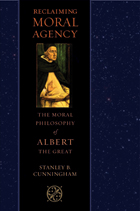

Drawing on the controversial case of “Ashley X,” a girl with severe developmental disabilities who received interventionist medical treatment to limit her growth and keep her body forever small—a procedure now known as the “Ashley Treatment”—Reconsidering Intellectual Disability explores important questions at the intersection of disability theory, Christian moral theology, and bioethics.
What are the biomedical boundaries of acceptable treatment for those not able to give informed consent? Who gets to decide when a patient cannot communicate their desires and needs? Should we accept the dominance of a form of medicine that identifies those with intellectual impairments as pathological objects in need of the normalizing bodily manipulations of technological medicine?
In a critical exploration of contemporary disability theory, Jason Reimer Greig contends that L'Arche, a federation of faith communities made up of people with and without intellectual disabilities, provides an alternative response to the predominant bioethical worldview that sees disability as a problem to be solved. Reconsidering Intellectual Disability shows how a focus on Christian theological tradition’s moral thinking and practice of friendship with God offers a way to free not only people with intellectual disabilities but all people from the objectifying gaze of modern medicine. L'Arche draws inspiration from Jesus's solidarity with the "least of these" and a commitment to Christian friendship that sees people with profound cognitive disabilities not as anomalous objects of pity but as fellow friends of God. This vital act of social recognition opens the way to understanding the disabled not as objects to be fixed but as teachers whose lives can transform others and open a new way of being human.
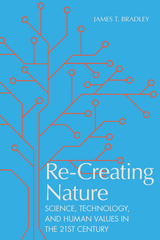
Many of the ethical issues raised by new technologies have not been widely examined, discussed, or indeed settled. For example, robotics technology challenges the notion of personhood. Should a robot, capable of making what humans would call ethical decisions, be held responsible for those decisions and the resultant actions? Should society reward and punish robots in the same way that it does humans? Likewise, issues of safety, environmental concerns, and distributive justice arise with the increasing acceptance of genetically modified organisms (GMOs) in food production nanotechnology in engineering and medicine, and human gene therapy and enhancement. The problem of dual-use—when a technology can be used both to benefit and to harm—exists with virtually all new technologies but is central in the context of emerging 21st century technologies ranging from artificial intelligence and robotics to human gene-editing and brain-computer interfacing.
In Re-Creating Nature: Science, Technology, and Human Values in the Twenty-First Century, James T. Bradley addresses emerging biotechnologies with prodigious potential to benefit humankind but that are also fraught with ethical consequences. Some actually possess the power to directly alter the evolution of life on earth including human. Specifically, these topics include stem cells, synthetic biology, GMOs in agriculture, nanotechnology, bioterrorism, CRISPR gene-editing technology, three-parent babies, robotics and roboethics, artificial intelligence, and human brain research and neurotechnologies.
Offering clear explanations of these various technologies, a pragmatic presentation of the conundrums involved, and questions that illuminate hypothetical situations, Bradley guides discussions of these and other thorny issues resulting from the development of new biotechnologies. He also highlights the responsibilities of scientists to conduct research in an ethical manner and the responsibilities of nonscientists to become “science literate” in the twenty-first century.

A profound feminist Christian reframing of sexuality examines contemporary social practices and ethical sex
From the sexual abuse crisis in the Roman Catholic Church to the US Supreme Court decision outlawing state-level bans on same-sex marriage, it has become clear that Catholics and other Christians cannot afford to downplay sex or rely on outdated normative understandings of its moral contours. Feminist theological approaches offer a way forward by considering not just what we should do in sexual spheres but also what sort of sexual people we should aspire to be.
In Reenvisioning Sexual Ethics, author Karen Peterson-Iyer adopts a feminist Christian anthropological framework to connect robust theological and ethical analysis to practical sexual issues, particularly those confronting college-aged and younger adults today. The book examines four divergent yet overlapping contemporary social practices and phenomena wherein sex plays a central role: “hookup” culture; “sexting”; sex work; and sex trafficking. Through these case studies, Peterson-Iyer shows that ethical sex is best demarcated not as a matter of chastity on the one hand and purely free consent on the other, but rather as ideally expressing the fullness of human agency, communicating the joy of shared pleasure, and conferring a deep sense of possibility and wholeness upon all participants.
This feminist Christian framework will help facilitate frank and profound discussions of sex, enabling young adults to define themselves and others not by hypersexualized and gendered social norms or attitudes but by their fundamental status as dignified and beloved by God.

Of the over 33 million refugees and internally displaced people in the world today, a disproportionate percentage are found in Africa. Most have been driven from their homes by armed strife, displacing people into settings that fail to meet standards for even basic human dignity. Protection of the human rights of these people is highly uncertain and unpredictable. Many refugee service agencies agree advocacy on behalf of the displaced is a key aspect of their task. But those working in the field are so pressed by urgent crises that they can rarely analyze the requirements of advocacy systematically. Yet advocacy must go beyond international law to human rights as an ethical standard to prevent displaced people from falling through the cracks of our conflicted world.
Refugee Rights: Ethics, Advocacy, and Africa draws upon David Hollenbach, SJ's work as founder and director of the Center for Human Rights and International Justice at Boston College to provide an analytical framework for vigorous advocacy on behalf of refugees and internally displaced people. Representing both religious and secular perspectives, the contributors are scholars, practitioners, and refugee advocates—all of whom have spent time "on the ground" in Africa. The book begins with the poignant narrative of Abebe Feyissa, an Ethiopian refugee who has spent over fifteen years in a refugee camp from hell. Other chapters identify the social and political conditions integral to the plight of refugees and displaced persons. Topics discussed include the fundamental right to freedom of movement, gender roles and the rights of women, the effects of war, and the importance of reconstruction and reintegration following armed conflict. The book concludes with suggestions of how humanitarian groups and international organizations can help mitigate the problem of forced displacement and enforce the belief that all displaced people have the right to be treated as their human dignity demands.
Refugee Rights offers an important analytical resource for advocates and students of human rights. It will be of particular value to practitioners working in the field.
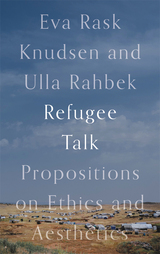
An innovative approach to the refugee crisis through a focus on language use, discourse and representation
'A wide-ranging, erudite and multi-faceted analyses of the fundamental problem of who gets to be counted as human' - Kate Evans
What does it mean to be a refugee? What political questions do they raise? Through what political rhetoric is their experiences parsed? The ongoing refugee crisis has sparked all these questions and more.
Refugee Talk uses conversation as a research method and ethical practice to approach the representation of and the discourse about and by the refugee. Though refugees who cross borders are routinely registered, filed, and detained, the individual stories they carry are just as routinely overlooked or ignored. When language itself becomes another border that excludes refugees, the need for a new vocabulary that decriminalizes and re-humanizes the refugee experience asserts itself.
The authors engage theoretically with thinkers from Hannah Arendt to Paolo Freire and Kwame A. Appiah and structure the book around conversations with academics, activists, journalists, and refugee artists and writers. The result is a comprehensive humanities approach that places ethics and aesthetics at its core.
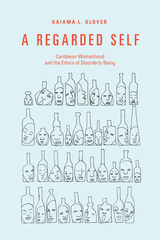
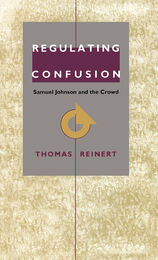
Ambivalent about the disruption, confusion, perplexity, and boundless variety apparent in the London of his day, Johnson was committed to the conventions of moral reflection but also troubled by the pressure to adopt the perspective of the crowd and the language of social theory. Regulating Confusion explores the consequences of his ambivalence and his attempt to order the chaos. It discusses his critique of moral generalizations, concept of moral reflection as a symbolic gesture, and account of what happens to the notion of character when individuals, having lost the support of moral convention, become faces in a crowd. Reflecting generally on the relationship between skepticism and political ideology, Reinert also discusses Johnson’s political skepticism and the forms of speculation and action it authorized.
Challenging prevalent psychologizing and humanistic interpretations, Regulating Confusion leaves behind the re-emergent view of Johnson as a reactionary ideologue and presents him in a theoretically sophisticated context. It offers his style of skepticism as a model of poise in the face of confusion about the nature of political truth and personal responsibility and demonstrates his value as a resource for students of culture struggling with contemporary debates about the relationship between literature and politics.

The Supreme Court has ruled that states may prohibit physician-assisted suicide. Expressing the views of his fellow justices, Chief Justice Rehnquist wrote, "Americans are engaged in an earnest and profound debate about the morality, legality, and practicality of physician-assisted suicide. Our holding permits this debate to continue." Regulating How We Die is certain to be a landmark contribution to that debate.Dr. Linda Emanuel--one of America's most influential medical ethicists--has assembled leading experts to provide not only a clear account of the arguments for and against physician-assisted suicide and euthanasia but also historical, empirical, and legal perspectives on this complicated issue. These contributors include Marcia Angell, George Annas, Susan Wolf, and many others.
The important questions are addressed here, including: What does mercy dictate? Does physician-assisted suicide honor or violate autonomy? Is it more dignified than natural death? Is this decision purely a private matter? Will legalizing physician-assisted suicide put us on a slippery slope toward involuntary euthanasia? And, in an analysis of data not available in any other book, what can we learn from Holland, the only country in which physician-assisted suicide and euthanasia are legal?
Regulating How We Die will be essential reading for anyone who has been handed a terminal diagnosis, for people close to those facing such a diagnosis, for professionals, including physicians, nurses, pastors, lawyers, legislators--indeed, for anyone who has considered the moral and political debate over doctor-assisted suicide.

In Replacement Parts, internationally recognized bioethicist Arthur L. Caplan and coeditors James J. McCartney and Daniel P. Reid assemble seminal writings from medicine, philosophy, economics, and religion that address the ethical challenges raised by organ transplantation. Caplan's new lead essay explains the shortfalls of present policies. From there, book sections take an interdisciplinary approach to fundamental issues like the determination of death and the dead donor rule; the divisive case of using anencephalic infants as organ donors; the sale of cadaveric or live organs; possible strategies for increasing the number of available organs, including market solutions and the idea of presumed consent; and questions surrounding transplant tourism and "gaming the system" by using the media to gain access to organs.
Timely and balanced, Replacement Parts is a first-of-its-kind collection aimed at surgeons, physicians, nurses, and other professionals involved in this essential lifesaving activity that is often fraught with ethical controversy.

Because of the profound effects of the built environment on the availability of natural resources for future generations, those involved with designing, creating, operating, renovating, and demolishing human structures have a vital role to play in working to put society on a path toward sustainability.
This volume presents the thinking of leading academics and professionals in planning, civil engineering, economics, ecology, architecture, landscape architecture, construction, and related fields who are seeking to discover ways of creating a more sustainable built environment. Contributors address the broad range of issues involved, offering both insights and practical examples. In the book:
- Stephen Kellert describes the scope of the looming ecological crisis
- Herman Daly explains the unsustainability of the world's economic system and the dangers inherent in the current movement toward globalization
- John Todd describes the evolution of wastewater processing systems inspired by natural systems
- John Tillman Lyle discusses the importance of landscape in the creation of the human environment
- Randall Arendt argues for a fundamental shift in land development patterns that would not only provide for more green space in new developments, but would also increase the profitability of developers and the quality of life for new home owners
- Thomas E. Graedel proposes the application of lessons learned from the emerging science of industrial ecology to the creation of "green" building.

Ecological restoration integrates the science and art of repairing ecosystems damaged by human activities. Despite relatively little attention from environmental ethicists, restoration projects continue to gain significance, drawing on citizen volunteers and large amounts of public funds, providing an important model of responding to ecological crisis. Projects range from the massive, multi-billion dollar Kissimmee River project; restoring 25,000 acres of Everglades' wetlands; to the $30 million effort to restore selected wetlands in industrial Brownfield sites in Chicago's south side Lake Calumet area; to the reintroduction of tall grass prairie ecosystems in various communities in the Midwest.
Restored to Earth provides the first comprehensive examination of the religious and ethical dimensions and significance of contemporary restoration practice, an ethical framework that advances the field of environmental ethics in a more positive, action-oriented, experience-based direction. Van Wieren brings together insights and examples from restoration ecology, environmental ethics, religious studies, and conservation and Christian thought, as well as her own personal experiences in ecological restoration, to propose a new restoration ethic grounded in the concrete, hands-on experience of humans working as partners with the land.
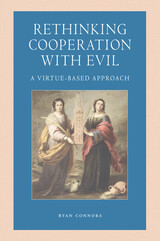

As members of various and often conflicting communities, how do we reconcile what we have come to understand as our human rights with our responsibilities toward one another? With the bright thread of individualism woven through the American psyche, where can our sense of duty toward others be found? What has happened to our love—even our concern—for our neighbor?
In this revised edition of his magisterial exploration of these critical questions, renowned ethicist Arthur Dyck revisits and profoundly hones his call for the moral bonds of community. In all areas of contemporary life, be it in business, politics, health care, religion—and even in family relationships—the "right" of individuals to consider themselves first has taken precedence over our responsibilities toward others. Dyck contends that we must recast the language of rights to take into account our once natural obligations to all the communities of which we are a part.
Rethinking Rights and Responsibilities, at the nexus of ethics, political theory, public policy, and law, traces how the peculiarly American formulations of the rights of the individual have assaulted our connections with, and responsibilities for, those around us. Dyck critically examines contemporary society and the relationship between responsibilities and rights, particularly as they are expressed in medicine and health care, to maintain that while indeed rights and responsibilities form the moral bonds of community, we must begin with the rudimentary task of taking better care of one another.

In our globalized world, differing conceptions of human nature and human values raise questions as to whether universal and partisan claims and perspectives can be reconciled, whether interreligious and intercultural conversations can help build human community, and whether a pluralistic ethos can transcend uncompromising notions as to what is true, good, and just.
In this volume, world-class scholars from religious studies, the humanities, and the social sciences explore what it means to be human through a multiplicity of lives in time and place as different as fourth-century BCE China and the world of an Alzheimer’s patient today. Refusing the binary, these essays go beyond description to theories of aging and acceptance, ethics in caregiving, and the role of ritual in healing the inevitable divide between the human and the ideal.
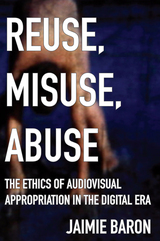
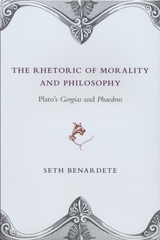
The Rhetoric of Morality and Philosophy, one of the most groundbreaking works of twentieth-century Platonic studies, is now back in print for a new generation of students and scholars to discover. In this volume, distinguished classicist Seth Benardete interprets and pairs two important Platonic dialogues, the Gorgias and the Phaedrus, illuminating Socrates’ notion of rhetoric and Plato’s conception of morality and eros in the human soul.
Following his discussion of the Gorgias as a dialogue about the rhetoric of morality, Benardete turns to the Phaedrus as a discourse about genuine rhetoric, namely the science of eros, or true philosophy. This novel interpretation addresses numerous issues in Plato studies: the relation between the structure of the Gorgias and the image of soul/city in the Republic, the relation between the structure of Phaedrus and the concept of eros, and Socrates’ notion of ignorance, among others.

Some acts are wrong, even if they have good results, and some are right even if the world would have been a better place without them. Here is a cogent and lucid argument for a system of morality that makes place for that which is right or wrong in itself and not just according to consequences. Charles Fried develops in this book a conception of right and wrong that supports judgments on subjects as various as tax structure, self-defense, kidney transplants, tort liability, and freedom of speech.
Fried begins by examining the demands of morality in two quite different cases: harming the innocent (where ordinary moral consciousness suggests absolutes) and lying (where consequences seem pertinent). Upon this foundation he elaborates a theory of rights that accounts for the obligation to contribute to the welfare of others but accounts also for the limits of that obligation. Comparisons and contrasts are drawn to economic theories of rights, and to the writings of Dworkin, Nozick, and Rawls. Finally, Fried considers how choices made within personal and professional roles—by friends and kin, by doctors and lawyers—are susceptible of moral judgment.
Right and Wrong will have an impact on ethical, legal, and social theory, and will profit anyone thinking about the requirements of a moral life.
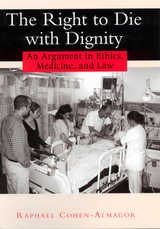
There are few issues more divisive than what has become known as “the right to die.” One camp upholds “death with dignity,” regarding the terminally ill as autonomous beings capable of forming their own judgment on the timing and process of dying. The other camp advocates “sanctity of life,” regarding life as intrinsically valuable, and that should be sustained as long as possible. Is there a right answer?
Raphael Cohen-Almagor takes a balanced approach in analyzing this emotionally charged debate, viewing the dispute from public policy and international perspectives. He offers an interdisciplinary, compelling study in medicine, law, religion, and ethics. It is a comprehensive look at the troubling question of whether physician-assisted suicide should be allowed. Cohen-Almagor delineates a distinction between active and passive euthanasia and discusses legal measures that have been invoked in the United States and abroad. He outlines reasons non-blood relatives should be given a role in deciding a patient’s last wishes. As he examines euthanasia policies in the Netherlands and the 1994 Oregon Death with Dignity Act, the author suggests amendments and finally makes a circumscribed plea for voluntary physician-assisted suicide.

Promoting Islam as a defender of human rights is laden with difficulties. Advocates of human rights will readily point out numerous humanitarian failures carried out in the name of Islam. In The Rights of God, Irene Oh looks at human rights and Islam as a religious issue rather than a political or legal one and draws on three revered Islamic scholars to offer a broad range of perspectives that challenge our assumptions about the role of religion in human rights.
The theoretical shift from the conception of morality based in natural duty and law to one of rights has created tensions that hinder a fruitful exchange between human rights theorists and religious thinkers. Does the static identification of human rights with lists of specific rights, such as those found in the Universal Declaration of Human Rights, make sense given the cultural, historical, and religious diversity of the societies in which these rights are to be respected and implemented? In examining human rights issues of the contemporary Islamic world, Oh illustrates how the value of religious scholarship cannot be overestimated.
Oh analyzes the commentaries of Abul A'la Maududi, Sayyid Qutb, and Abdolkarim Soroush—all prominent and often controversial Islamic thinkers—on the topics of political participation, religious toleration, and freedom of conscience. While Maududi and Qutb represent traditional Islam, and Soroush a more reform and Western-friendly approach, all three contend that Islam is indeed capable of accommodating and advocating human rights.
Whereas disentangling politics and culture from religion is never easy, Oh shows that the attempt must be made in order to understand and overcome the historical obstacles that prevent genuine dialogue from taking place across religious and cultural boundaries.
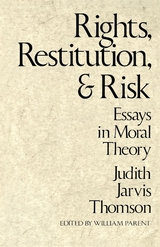
Moral theory should be simple: the moral theorist attends to ordinary human action to explain what makes some acts right and others wrong, and we need no microscope to observe a human act. Yet no moral theory that is simple captures all of the morally relevant facts.
In a set of vivid examples, stories, and cases Judith Thomson shows just how wide an array of moral considerations bears on all but the simplest of problems. She is a philosophical analyst of the highest caliber who can tease a multitude of implications out of the story of a mere bit of eavesdropping. She is also a master teller of tales which have a philosophical bite. Beyond these pleasures, however, she brings new depth of understanding to some of the most pressing moral issues of the moment, notably abortion. Thomson’s essays determinedly confront the most difficult questions: What is it to have a moral right to life, or any other right? What is the relation between the infringement of such rights and restitution? How is rights theory to deal with the imposition of risk?
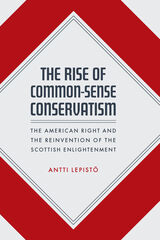
In considering the luminaries of American neoconservative thought—among them Irving Kristol, Gertrude Himmelfarb, James Q. Wilson, and Francis Fukuyama—Lepistö argues that the centrality of their conception of the common man accounts for the enduring power and influence of their thought. Intriguingly, Lepistö locates the roots of this conception in the eighteenth-century Scottish Enlightenment, revealing how leading neoconservatives weaponized the ideas of Adam Smith, Thomas Reid, and David Hume to denounce postwar liberal elites, educational authorities, and social reformers. Their reconfiguration of Scottish Enlightenment ideas ultimately gave rise to a defining force in modern conservative politics: the common sense of the common man. Whether twenty-first-century politicians who invoke the grievances of “the people” are conscious of this unusual lineage or not, Lepistö explains both the persistence of the trope and the complicity of some conservative thinkers with the Trump regime.

At the center of the debate over complementary and alternative medicine—from acupuncture and chiropractic treatments to homeopathy and nutritional supplements—is how to scientifically measure the effectiveness of a particular treatment. Fourteen scholars from the fields of medicine, philosophy, sociology, and cultural and folklore studies examine that debate, and the clash between growing public support and the often hostile stance of clinicians and medical researchers.
Proponents and critics have different methodologies and standards of evidence—raising the question of how much pluralism is acceptable in a medical context—particularly in light of differing worldviews and the struggle to define medicine in the modern world. The contributors address both the methodological problems of assessment and the conflicting cultural perspectives at work in a patient's choice of treatment. Sympathetic to CAM, the contributors nonetheless offer careful critiques of its claims, and suggest a variety of ways it can be taken seriously, yet subject to careful scrutiny.
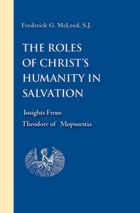
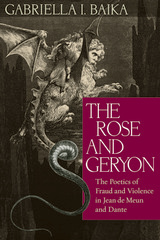
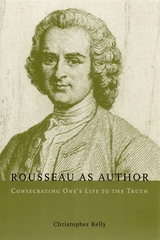
Unlike many other writers of his day, Rousseau refused to publish anonymously, even though he risked persecution for his writings. But Rousseau felt that authors must be self-restrained, as well as bold, and must carefully consider the potential political effects of what they might publish: sometimes seeking the good conflicts with writing the truth. Kelly shows how this understanding of public authorship played a crucial role in Rousseau's conception—and practice—of citizenship and political action.
Rousseau as Author will be a groundbreaking book not just for Rousseau scholars, but for anyone studying Enlightenment ideas about authorship and responsibility.

That’s the question that animates Jessica Pierce’s powerful Run, Spot, Run. A lover of pets herself (including, over the years, dogs, cats, fish, rats, hermit crabs, and more), Pierce understands the joys that pets bring us. But she also refuses to deny the ambiguous ethics at the heart of the relationship, and through a mix of personal stories, philosophical reflections, and scientifically informed analyses of animal behavior and natural history, she puts pet-keeping to the test. Is it ethical to keep pets at all? Are some species more suited to the relationship than others? Are there species one should never attempt to own? And are there ways that we can improve our pets’ lives, so that we can be confident that we are giving them as much as they give us?
Deeply empathetic, yet rigorous and unflinching in her thinking, Pierce has written a book that is sure to help any pet owner, unsettling assumptions but also giving them the knowledge to build deeper, better relationships with the animals with whom they’ve chosen to share their lives.
READERS
Browse our collection.
PUBLISHERS
See BiblioVault's publisher services.
STUDENT SERVICES
Files for college accessibility offices.
UChicago Accessibility Resources
home | accessibility | search | about | contact us
BiblioVault ® 2001 - 2024
The University of Chicago Press









